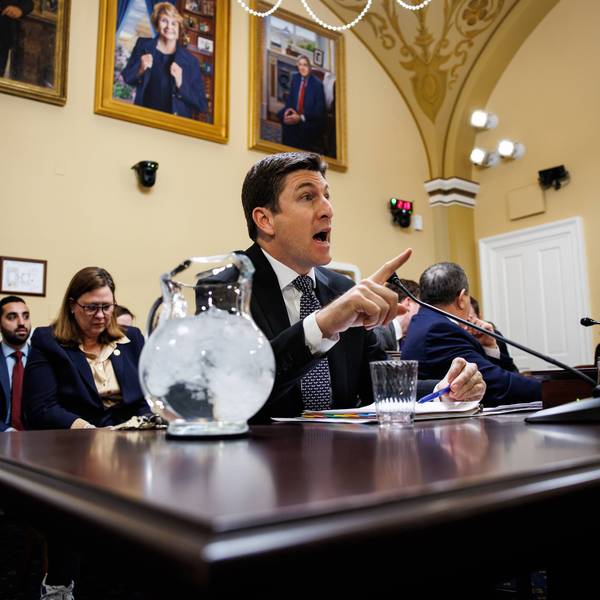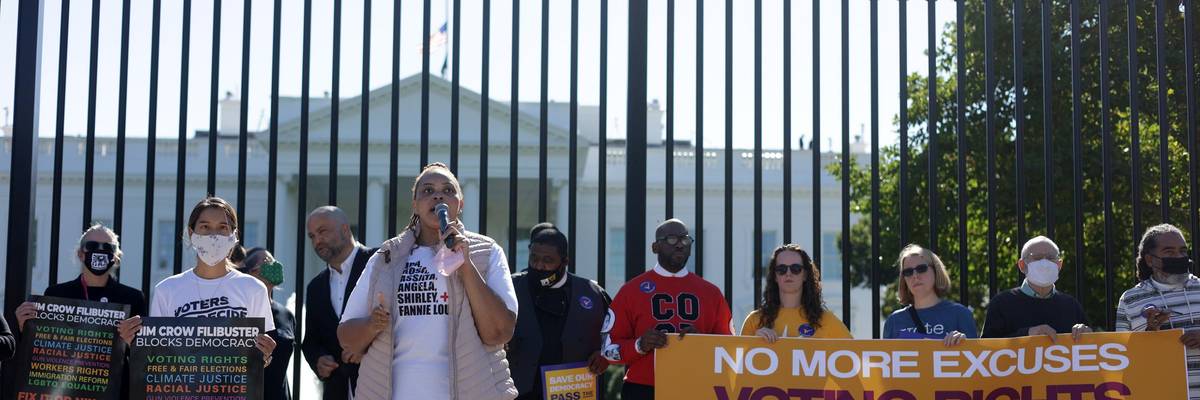Seven out ten of Americans believe the U.S. democracy is "in crisis and at risk of failing." And in this moment is our chance not only to pull back from the brink but to leap forward--aware that democracy is our "tap root" trouble: For progress on any of the crises weighing on us--whether climate, economic inequity, or lagging public health--depends on governance accountable to the American people.
Two critical voting-rights bills--H.R.4 and H.R.1, now pending in the Senate, are strong enough to remove some of our mightiest barriers to democracy.
Whether a couple or a country, facing a crisis requires confronting reality, even if it hurts. So, first let's make a quick, an eyes-wide-open assessment of our democracy, then explore opportunity--right now--to make history.
Our assumptions may be shattered, but our motivation to act might be stoked, enriching our lives with meaning and power...and who doesn't want that?
Here's my attempt at a clear-eyed look.
Four years ago 58 percent of Americans agreed our democracy was working well. But in a poll last spring, just 19 percent agreed our democracy provides a "good example" for the rest of the world.
From the mid-1960s to 1980 trust in government--essential to democracy--nose-dived from 77 percent to less than 30 percent. Now it's a mere 24 percent.
Grounds for Americans' withering assessments show up in rankings worldwide. Three independent bodies peg us way down the ladder, not even close to other long-term democracies. Freedom House puts us 61st from the best, and on par with Monaco, Romania, and Panama. Sweden-based V-Dem ranks us below 30 countries, including Greece, Slovakia, and Chile. Harvard's Electoral Integrity Project assessment places roughly 50 countries ahead of us.
And why do we show up so poorly?
First are our anti-democratic system rules.
Most obvious, our Constitution awards each state two seats, giving a voter in sparsely populated Wyoming 70 times the clout of a voter in California, whose population equals Canada's. So our Senate can be controlled by those representing less than 20 percent of the national vote, The Guardian calculated.
Second, citizens' votes don't decide elections; the Electoral College does.
As a result, during the 19th century the popular-vote winner lost the presidential election three times; and in the last two decades alone it's happened twice more.
Gerrymandering--the drawing of district lines to advantage one party--is another barrier to American democracy. Both parties do it, but Republicans control the line-drawing process in states representing 187 House seats compared to 75 for Democrats. Over the last decade, Republicans' redistricting efforts have helped them "build a greater political advantage in more states than either party had in the past 50 years," reports Associated Press.
Making matter worse, in the first nine months of 2021 alone, Republicans led efforts resulting in 33 laws in 19 states making voting more difficult.
Take mail-in ballots--shown to increase voter turnout. Eight European countries offer all voters the option, and 40 countries used mail-in voting in the last election. Here, only in five states do all eligible voters automatically receive a ballot in the mail.
Voter turnout tells us a lot about trust in government.
Through the '50's and '60's, more than 60 percent of our eligible population voted. But from 1972 on, turnout stayed mainly in the 50th percentiles. Then, 2020 turnout jumped to 67 percent, likely due to Trump's controversial presidency and expanded voting access for the COVID-19 pandemic.
Comparatively, in recent nationwide elections, the U.S. comes in a sad 30th out of 35 nations within the Organization for Economic Cooperation and Development. At the top? Australia and Sweden where 80 percent of citizens of voting age vote.
The "price tag" of an election and who pays are also good measures of democracy. When private donors foot the bill--as in our elections--their interests gain an edge over the public good. Our 2020 election costing $14.4 billion doubled the 2016 total--with three-fourths of donations coming from larger donors.
Note also, we allow billionaire donors to funnel their cash to super PACs and hybrid PACs and to spend unlimited sums, some of which is "dark money"--i.e., untraceable--in violation of democracy's principles of transparency.
And in election expenditures, how do we stack up?
Compare our 2020 per person election cost with that of Germany. Its was $1.33 while ours was 33 times greater, $43.00 for every man, woman, and child. Note that in Germany the public, along with party membership fees, covers two-thirds of election costs. That way, winners don't feel indebted to private funders.
And then, there's gerrymandering--the drawing of district maps for partisan advantage.
In 2010, Republicans, according the Brennan Center, were "wildly successful" in redrawing maps to gain control in 213 congressional districts, producing "some of the most extreme gerrymanders in history."
Had enough about our challenges?
Gotcha. So, here's the great news--first the big picture and then our historic chance, in this moment, to turn the tide.
A citizens' democracy movement--in its breadth perhaps unique in our history--is arising. Fed up, everyday citizens are stepping up to reverse a whole slew of assaults on our democracy--from voting rights to gerrymandering to removing money's grip.
My organization Small Planet Institute and the coalition Democracy Initiative, representing 45 million Americans, have created DemocracyMovement.US.
One of its champions a young Michigander, Katie Fahey. A recent New York Times story celebrates the anti-gerrymandering effort in Michigan initially triggered by her single Facebook post. Ultimately, it led to gathering 425,000 signatures statewide to pass a 2018 ballot initiative shifting responsibility for drawing district lines into the hands of an independent commission.
Now Michigan is in line with the practice of "most other long-term democracies," notes the The Washington Post. In all, now ten states have a nonpartisan commission with "primary responsibility" for drawing congressional district lines.
If you think of such democracy reforms as arcane and beyond reach, think again: My organization Small Planet Institute and the coalition Democracy Initiative, representing 45 million Americans, have created DemocracyMovement.US. It's a handy tool.
There you'll find an urgent, national action you can take right now for democracy; and you can also quickly jump to your state to weigh in on democracy reforms closest to home.
Now to our chance to make history in this moment.
Two critical voting-rights bills--H.R.4 and H.R.1, now pending in the Senate, are strong enough to remove some of our mightiest barriers to democracy. And if necessary, to make that win possible, Senate Majority Leader Chuck Schumer, "has repeatedly vowed to launch an effort to change the Senate's filibuster rules by Martin Luther King Jr. Day on Jan. 17."
All Senate Democrats support the bills. However, Senators Joe Manchin of West Virginia and Kyrsten Sinema of Arizona as well as a few other holdouts have opposed changing filibuster rules to make passage possible.
Now, we can call our representatives to push these senators, and why not try phone banking with Common Cause? It's empowering callers to reach folks in the critical states. And phone banking is kick: Through an automated setup, you give callers an immediate way to leave a message for their legislators.
Most Americans feel our democracy is in big trouble; yet many fewer know that this week is a critical moment for turning the tide. Acting now, we nourish the endangered tap root--democracy--and simultaneously fight despair as we discover new connections, meaning, and power.
Now there's a win-win-win.




